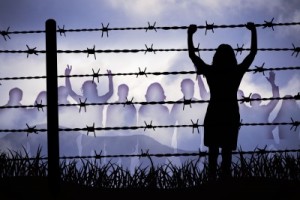 By some counts there are 43.3 million displaced people around the world in need of resettlement. Many would probably be happy to come to Australia but we can’t take them all. We do take a reasonable number in relation to our population though we could probably take more.
By some counts there are 43.3 million displaced people around the world in need of resettlement. Many would probably be happy to come to Australia but we can’t take them all. We do take a reasonable number in relation to our population though we could probably take more.
Some refugees I have met (e.g. from Burundi) waited in primitive and unsafe camps for 10 years and more after suffering atrocities and persecution. Here in Australia, professionals and volunteers do their best, a good best, to help them build a normal life for themselves.
Those who come by boat uninvited, often without identification, and have to be processed here cost Australia more proportionally, and have not waited their turn. Their journey may not be more dangerous for them than a trek through the desert for Africans. The suffering that caused them to leave is presumably more or less equal to that of those who have waited in camps.
They may, of course, have valid reasons for coming by boat. But such asylum seekers may also be seeking advantages (e.g. earlier resettlement in a country of their choice) not sanctioned by the refugee convention. The region should perhaps build transit camps for them and thus give them the opportunity to become part of the greater system. (Malcolm Fraser, The Age 29.7.13)
It is nice to be able to be kind and welcoming to people who have suffered hardship and quite a lot of Australians have spoken out in support of asylum seekers. But if these kind people then also ask for higher wages for themselves, better roads, schools and hospitals etc., all of course as such worthwhile expenditure, as well as lower taxes, it is unrealistic not to prioritise. We may be able to afford all this but it is more likely we will all have to make some sacrifices and that needs to be discussed. (We will also, of course, eventually have contributing new citizens.)
The reasons for people fleeing are sometimes related to geographical problems (and with climate change this will increasingly be the case) but far more frequently to bad governments. These could, in theory (though so far rarely in practice) be either assisted and improved or advantageously replaced.
It may soon even be necessary to reserve refugee status for people whose lands can no longer support them and we should perhaps start planning for that. Does the global community eventually need to become some kind of a political federation in which a ‘federal government’ has some real authority beyond sanctions and wars? It is absurd that abandoning often perfectly good homes and land should seem the only option for so many.
Kevin Rudd’s Papua New Guinea solution has been condemned as inhumane and unfair by many kind and decent people. Of course, Manus Island and Nauru have so far been run as a variety of penal settlement so as to provide a deterrent to boat people. But we have to ask ourselves whether deterrents can work here; unless our human rights abuses are worse than those of the countries people flee from, they are unlikely to be effective. And obviously nobody in Australia wants to abuse people.
But do camps have to be run that way? Displaced persons’ camps necessarily provide challenges (they are random congregations of uprooted and desperate people) but they have been managed well before this time and it can be done again.
For people used to a temperate climate, PNG may not be inviting, but much of Australia isn’t either, nor much of Afghanistan or Africa, and humans have been living on the PNG islands successfully for ten thousand years.
PNG is also a country that could arguably benefit from some immigration, particularly of people with modern skills and experiences, to help it into the 21st century. Of course its government would have to be given a certain amount of financial aid, and this has been promised by Rudd. (Australia has not done much for PNG in all the years since it first took over the mandate.) Presumably Prime Minister Peter O’Neill has recognized a genuine opportunity here for his country; for asylum seekers too there may be genuine opportunities to establish themselves and be useful and thrive. It would be a shame if well-meaning Australian activists undermined this. There is also no reason why PNG should not take some of the world’s refugees if it is willing to help.
For those asylum seekers who choose to come by boat as a quick and easy way to find a comfortable new start in Australia, a humane PNG solution may actually end up being the deterrent we have sought. (Once boat people who are genuine refugees have PNG citizenship, they could presumably attempt to come to Australia legally, if this was still what they wished.)
It is of course irritating that Kevin Rudd’s PNG solution has been advanced as part of an election battle by a politician who has not always behaved well; it is also too similar to Tony Abbott’s desired monopoly on callous ‘toughness’ to appeal to either constituency. But this does not mean there can be no merit in it. Tony Burke, who has taken charge of this portfolio, seems a decent, competent and trustworthy person.
If PNG does end up taking our asylum seekers, we should perhaps raise our regular intake of refugees as a gesture of solidarity and fairness. Whatever we do can only ever be a drop in the ocean.
– Silke Hesse, CLA member, Melbourne

